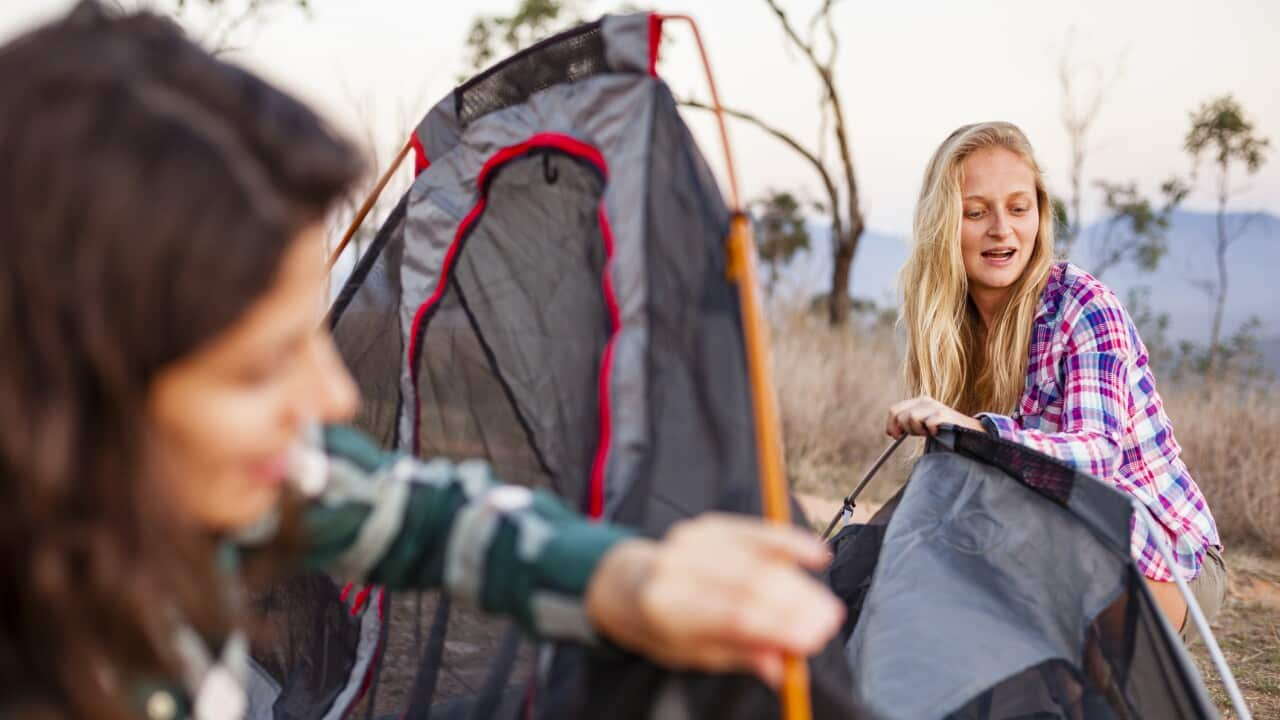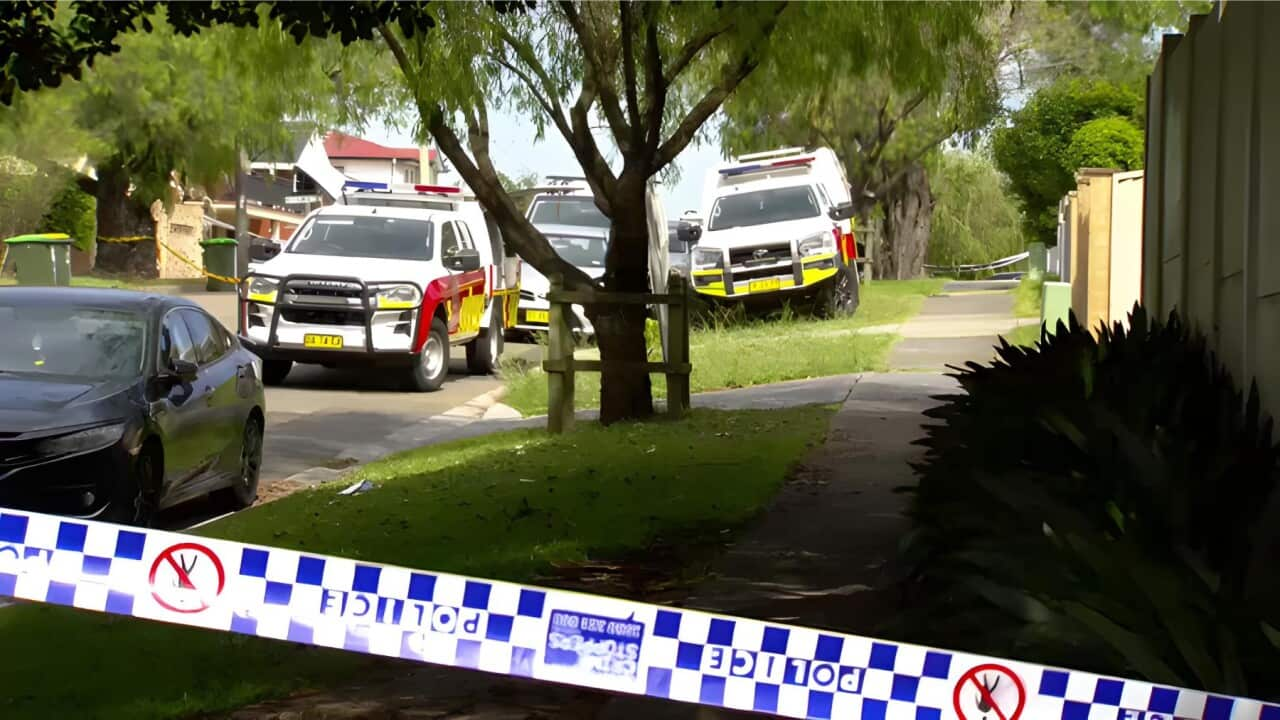ќе ви помогне да зборувате, разберете и да се поврзете во Австралија -
Оваа лекција одговара на познавачите на јазикот од средно ниво. Откако ќе ја слушнете, тестирајте го Вашето знаење со нашиот квиз.
Белешки за учење
Различни фрази што треба да се користат при поставување шатор:
- Let’s pitch this tent.
- Grab the pegs.
- Put up the tarp.
- Set up the tent poles.
- Stake down the corners.
- Make sure it’s level.
Колоквијални изрази:
Every now and then е неформална фраза што значи понекогаш или повремено.
All the things Allan and Claire get up to is an informal and slightly humorous way of say all the things that they do because to get up to something is to do something that naughty that you should not be doing - Да се биде палав.
Речник:
Stunning значи многу убав.
To stun значи да ги чукне по глава за да се чувствуваат зашеметено и да не можат нормално да размислуваат.
Camping живее или престојува во шатор. Луѓето кои уживаат на отворено можат да одморат на кампување.
A campground or campsite е место каде што луѓето одат на кампување.
To pitch a tent значи да се постави шатор.
To pitch something значи да се стави или фрли нешто нагоре, како да се фрла топка.
To pitch an idea значи да предложите идеја и да се обидете да убедите некого дека е добра.
Gear е неформален начин на кажување „работи“, често опрема што се користи за хоби или спорт.
Pegs, or stakes се металните шипки што ги туркате во земја за да го одржите шаторот на место.
To grab something формално значи брзо да се повлече нешто кон себе, но неформално се користи на австралиски англиски едноставно да значи да се добие нешто или да се предаде нешто за вас. Го слушаш цело време. На пример, луѓето често велат ‘let’s grab a bite to eat!”
To stake down the corners значи да се стави кол или колче во секој агол за да се чува шаторот безбеден.
To tilt значи да паднеш на една страна, да не бидеш израмнет- навален.
A tarp е мушама или голем водоотпорен чаршав, обично направен од пластика, кој можете да го користите за да покриете нешто што не сакате да се намокри.
Level-headed значи смирен и под контрола.
Mozzy е неформален збор за комарец.
Mozzy spray спреј за заштита на луѓето од комарци.
To whack something on е неформален начин да се каже да се стави нешто брзо.
Фокус на учење:
Честопати сакаме да бидеме учтиви на пријателски отколку на формален начин. Можеме да го направиме ова на англиски така што ќе се појавиме да прашаме дали некој може да направи нешто наместо да му кажеме да го направи тоа. Друг начин е да се користат неформални зборови наместо формални зборови. На пример, Јосипа го дава примерот што Алан може да и каже на Клер ‘can you grab the tomato sauce’.. Тој ја користи фразата ‘can you’, така што неговото барање изгледа како прашање, но не сака да знае дали Клер може да му го набави сосот од домати, тој сака таа навистина да го направи тоа! Тој исто така избира да го користи неформалниот збор ‘grab’ наместо поформалниот збор „get“ или „pass“. Ова помага да се направи неговото барање не само учтиво, туку и пријателско. Еве неколку други примери што може да ги слушнете како луѓето велат:
- Can you grab his name (= please take down his name)
- Can you grab me a sandwich (= please buy me a sandwich)
- Can you grab the phone (= please answer the phone)
Слушајте за други примери.
Транскрипт:
(Note: This is not a word-for-word transcript)
SBS acknowledges the Traditional Custodians of Country and their connections and continuous care for the skies, lands, and waterways throughout Australia.
Ahh…fresh air. Hello, I’m Josipa and every now and then I like to take a break from the city and enjoy nature. When I first arrived in Australia, I fell in love with the long, sandy beaches. But the beaches near the city can get really crowded. And I don’t like that.
So sometimes I drive a bit further out from the city to find stunning, quiet beaches where I can enjoy nature for days.
Stunning, by the way, means really very beautiful - so beautiful that you are stunned or so impressed you can’t move. There are often campgrounds or campsites near these beaches where you can stay.
A campground or campsite is a place where people go camping, that is, stay there in a tent. It’s the type of holiday I really like because I can enjoy the outdoors without having to go home or stay in a hotel.
Many campgrounds have facilities like toilets, outdoor showers, BBQ areas and spaces to pitch your tent.
To pitch your tent means to put up a tent, but we can also use the word pitch if we want to throw out or share an idea with somebody for them to think about. In that case, you might say, ‘I’d like to pitch an idea.’ It means you want to present your idea for them to consider.
Or if you want to help out, you can say that you would like to ‘pitch in’. Let’s all pitch in and work together. ‘Pitch in’ means to contribute or help with something, especially when working as part of a group.
Here, the word pitch means to set something up, in this case, a tent. In this episode we are focusing on phrases related to setting up a tent.
Allan and Claire love camping. They’ve pitched their tents all over Australia. And to be completely honest, sometimes I get jealous about all the things Allan and Claire get up to, that means, all the exciting things that they do.
Right now, they’re pitching a tent probably somewhere absolutely stunning. Let’s hear how they talk about what they are doing.
Allan
Alright, let’s get all our gear out and pitch this tent before it gets dark.
Claire
Good idea. Do you want me to grab the pegs?
Allan
Yes, please. I’ll put up the tarp.
Claire
And I can set up the tent poles.
Allan
First, let me stake down the corners.
Claire
The tent’s looking good. Let’s make sure it’s level, though.
Allan
Perfect. All set! Time to whack on some mozzy spray and enjoy the campfire.
There’s a lot of new words to learn when we want to talk about camping, so let’s get into it.
Allan first said,
Let’s get all our gear out and pitch this tent before it gets dark.
So, Allan wants to take the gear out of the car and pitch the tent before it gets dark.
When we say 'gear,' we mean all the things you need for camping. Besides a tent, what other gear do you think you should bring camping? I can think of a few things— food, water and an esky (a cooler to keep my food and drinks cold) And a camping chair would be good too, so that I can sit and enjoy a cold drink.
Claire then said,
Do you want me to grab the pegs?
Pegs, or stakes as they are often called, are metal pins that you push into the ground to keep the tent in place. Let’s hear Claire’s question once again.
Do you want me to grab the pegs?
So, Claire is asking if she should grab the pegs, which is another way of saying ‘get the pegs.’
We say ‘grab’ when we want to have or get something. For example, when Allan and Claire are cooking sausages for their camp dinner later, one of them might say ‘can you grab the tomato sauce’ which is a friendly way of saying ‘please get the tomato sauce.’
Allan replied,
I’ll put up the tarp.
A tarp is a big waterproof sheet, usually made of plastic, that you can use to cover things that you don’t want to get wet. In this case, the tarp will cover the tent to protect it if it rains. You tie ropes to the corners and attach them to something like a tree or pole.
So, when Allan says he wants to ‘put up a tarp’, he means he wants to set it up, over the tent, for cover in case it rains.
Back to the conversation,
Claire:
And I can set up the tent poles.
Allan:
First, let me stake down the corners.
This is classic tent talk! Tent poles are the sticks that make the frame for the tent. You usually have to put them together to make the frame.
And to stake down the corners means to push the stakes, the metal pins, into the ground to keep a tent in place.
The tent’s looking good. Let’s make sure it’s level, though.
Claire wants to make sure the ground they’re choosing to pitch the tent on is flat, or level, so the tent doesn’t tilt, that is, doesn’t fall to one side.
Allan and Claire seem really level-headed while as they are setting up their tent. I know when I try, I can get very frustrated and not level-headed at all!
To be level-headed means to stay calm and in control. Are you a level-headed person or do you easily get frustrated?
At the end of our dialogue, Allan said,
Time to whack on some mozzy spray and enjoy the campfire.
Mozzy is an informal word for mosquito, and mozzy spray is mosquito repellent, that is, the spray that you put on to keep mosquitoes away from you.
Allan didn’t just say ‘put on mozzy spray’; he said, ‘whack on mozzy spray!’ When you want to put something on quickly, you can say ‘whack it on.’ For example, if you’re late for work, you’d whack your clothes on fast!
Big thanks to our guest Magda Dejneka. Paul Nicholson and Lily O'Sullivan voiced the characters of Allan and Claire and Professor Lynda Yates was our educational consultant.











